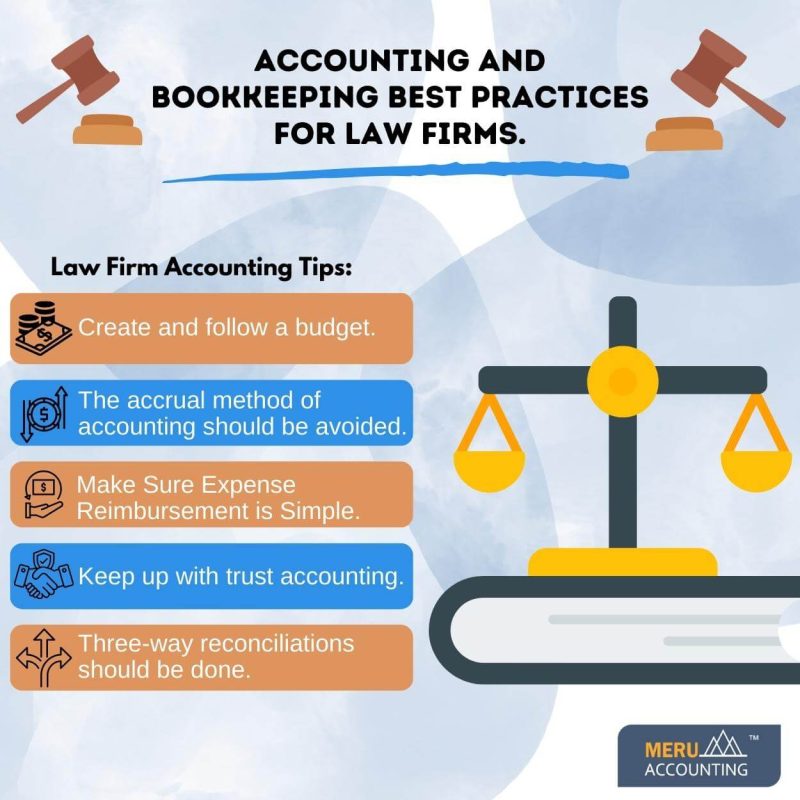- Schedule Meeting
Accounting And Bookkeeping Best Practices For Law Firms.

It’s essential to comprehend the essentials of accounting and bookkeeping to ensure that your business adheres to moral standards. In this article, we go through law firm accounting best practices for precise and efficient law firms.
Law Firm Accounting Tips:
- Create And Follow A Budget
One of the law firm accounting best practices is to create a budget outline. Setting a budget for your legal practice is crucial in order to establish expectations for cash flow and expenses as well as income targets.
Setting aside money for more significant costs like annual bar association dues, legal research services, and IT updates is simpler when you have a budget.
Although there are several ways to create a budget, you must first develop a plan of action. Make a list of your necessary expenditures first, such as rent, license fees, and utilities.
You can assess your financial situation realistically after projecting your income.
- The Accrual Method Of Accounting Should Be Avoided
Prior to filing their first tax return, new businesses must choose their preferred accounting technique. You can choose between the accrual and cash methods, but since legal firms are often PSCs, regardless of size, they are permitted to employ the cash method of accounting.
The cash approach makes it simpler to pay the tax due and more accurately aligns taxable income with cash received.
By utilizing it on your first return, you may use the cash method of accounting. You must submit a request to the IRS to switch to the cash method if you have previously filed a tax return using the accrual method.
- Make Sure Expense Reimbursement Is Simple
It’s an excellent idea to mandate that all workers and partners use a business credit card to ensure simple expense reimbursements.
By doing this, a more direct paper trail is created, and tracking spending for each client and partner is made simpler. Advance client costs are the usual name for reimbursable expenses.
- Keep Up With Trust Accounting
For law firm accounting tips, trust accounting is a crucial component of accounting. It is the practice of retaining client funds granted in trust, such as unearned fees paid as retainers, court expenses, settlement funds, or advanced costs, in a different account from legal office operating funds.
Because there are so many strict regulations regarding what you can and cannot do with trust accounts, they are one of the accounting areas where law firms make mistakes most frequently. These restrictions carry serious consequences, including disbarment.
- Three-Way Reconciliations Should Be Done
In a three-way reconciliation, the trust bank account, trust ledger, and individual client ledgers are balanced. Every state bar association mandates that law firms reconcile their trust bank statement on a monthly or quarterly basis to the individual balances of their customers.
In 30 to 90 days, you must execute a three-way reconciliation between the trust bank account, trust ledger, and individual client ledgers as required by every state bar. It is one of the best practices of law firm accounting tips.
Meru Accounting is a proficient site for more information on accounting and bookkeeping practices for law firms.
We are a unique team of experts with specialization in MYOB, Xero Silver Champion & Advisors, and QB Pro Advisors.
- 3rd Floor 207 Regent Street, London, W1B 3HH.
- Phone: +44 73 6051 0348
- Email: [email protected]
TAX RETURN SERVICES
Join Our Newsletter Now
Be the First to Know. Sign up for our newsletter today.
© 2013-2025 Meru Accounting. All Rights Reserved.
Privacy Policy
We are a unique team of experts with specialization in MYOB, Xero Silver Champion & Advisors, and QB Pro Advisors.
- 3rd Floor 207 Regent Street, London, W1B 3HH.
- Phone: +44 73 6051 0348
- Email: [email protected]
Request Call Back

Meru Accounting
First Month Bookkeeping Free !
- Free Trial for First month Bookkeeping services worth $95
- Get Monthly Financial Statement( Click here )
- Dedicated Accountant with Backup person for each Business
- Latest Infrastructure with Great IT security
( Virtual Tour to our office )

Meru Accounting
First Month Bookkeeping Free !
- Free Trial for First month Bookkeeping services worth $95
- Get Monthly Financial Statement( Click here )
- Dedicated Accountant with Backup person for each Business
- Latest Infrastructure with Great IT security
( Virtual Tour to our office ) - Tax Filing Starting at just $350 ( Federal + 1 State )
( Check pricing for Business Owners)
Error: Contact form not found.
This will close in 0 seconds
Request Call Back OnClick

Meru Accounting
First Month Bookkeeping Free !
- Free Trial for First month Bookkeeping services worth $95
- Get Monthly Financial Statement( Click here )
- Dedicated Accountant with Backup person for each Business
- Latest Infrastructure with Great IT security
( Virtual Tour to our office )

Meru Accounting
First Month Bookkeeping Free !
- Free Trial for First month Bookkeeping services worth $95
- Get Monthly Financial Statement( Click here )
- Dedicated Accountant with Backup person for each Business
- Latest Infrastructure with Great IT security
( Virtual Tour to our office ) - Tax Filing Starting at just $350 ( Federal + 1 State )
( Check pricing for Business Owners)
Error: Contact form not found.
This will close in 0 seconds
Calendly
This will close in 0 seconds
office video
This will close in 0 seconds

